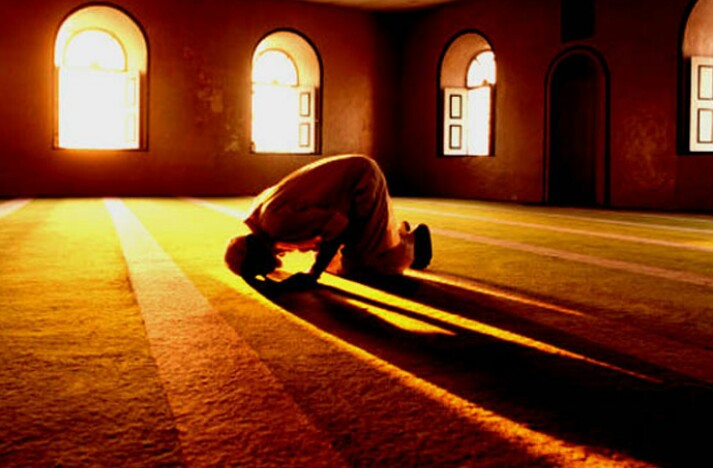By Bahron Ansori, Senior Editor of MINA
Believers who fast, before the last 10 days usually do I’tikaf in the mosque. Of course, the goal is to be able to achieve Ramadan perfection. What and how exactly it is, will be discussed in this short article.
In language, I’tikaf means to settle on something. Meanwhile, according to the term syar’i, I’tikaf means staying in a mosque in a special manner accompanied by an intention (Al Mawsu’ah Al Fiqhiyah, 2/1699).
Then, what are the arguments that suggest a believer who fasts and enters the last ten days of doing I’tikaf? Ibnul Mundzir said, “The scholars agree that I’tikaf is sunnah, it is not obligatory unless someone obliges himself to carry out the I’tikaf.” (Al Mughni, 4/456)
Also Read: Sadaqah, A Simple Act with Extraordinary Virtues: Dr. Wahyudi KS
From Abu Hurairah, he said,
كَانَ النَّبِىُّ – صلى الله عليه وسلم – يَعْتَكِفُ فِى كُلِّ رَمَضَانَ عَشْرَةَ أَيَّامٍ ، َ
“The Prophet sallallaahu ‘alaihi wa sallam used to did i’tikaf in the month of Ramadan for ten days. But in the year of his death, he did i’tikaf for twenty days. ” (HR. Bukhari no. 2044).
When is the time of I’tikaf?
Also Read: The Dynamics of Living in a Muslim Community in the Modern Era
When I’tikaf which is more afdhol is at the end of Ramadan (the last 10 days of Ramadan) as the hadith ‘Aisyah, she said,
أَنَّ النَّبِىَّ – صلى الله عليه وسلم – كَانَ يَعْتَكِفُ الْعَشْرَ الأَوَاخِرَ مِنْ رَمَضَانَ حَتَّى تَوَهْعُْ
“The Prophet sallallaahu ‘alaihi wa sallam do i’tikaf on the last ten days of Ramadan until his death then his wives also do i’ tikaf after his departure.” (Narrated by Bukhari no. 2026 and Muslim no. 1172).
What is the goal, and where is the i’tikaf done?
Also Read: The Meaning of “Minal Aidin wal Faizin”
The Prophet sallallaahu ‘alaihi wa sallam di i’tikaf in the last ten days with the aim of getting the night of lailatul qadar, to get rid of all the busyness of the world, so that it is easy to munajat with his Rabb, pray a lot and do a lot of dhikr at that Latho-if Al Ma ‘arif, p. 338)
As Allah Ta’ala says,
وَلَا تُبَاشِرُوهُنَّ وَأَنْتُمْ عَاكِفُونَ فِي الْمَسَاجِدِ
“(But) do not interfere with them while you are doing i’tikaf in the mosque.” (Surah Al Baqarah: 187).
Also Read: The Atrocities of Zionist Israel During Ramadan
Another argument that shows that I’tikaf is done in the mosque is as was done by the Prophet sallallaahu ‘alaihi wa sallam and his wives also did it in the mosque. Never did the Prophet sallallaahu ‘alaihi wa sallam and his wives do I’tikaf at home.
Ibn Hajar rahimahullah said, “The scholars agree that it is required to do I’tikaf in the mosque.” (Fathul Bari, 4/271). Including women, he is allowed to do i’tikaf as a man, it is not legal if it is done other than in the mosque. (Al Mawsu’ah Al Fiqhiyah, 2/13775).
Based on the hadith above, I’tikaf can be done in any mosque, as long as the mosque is used for worship. According to Imam Bukhari and the scholars I’tikaf can be done in any mosque. Because the verse that commands the I’tikaf is general.
According to the majority of scholars, i’tikaf is permitted in all mosques because of the generality of the word of Allah above (which means) “While you are giving the ‘tikaf in the mosque.” Imam Malik said that i’tikaf can be done in any mosque (as long as the five daily prayers are enforced there, pen) because of the proclamation of the word of Allah Ta’ala,
Also Read: Imaam Yakhsyallah Explains the Interpretation of Quran Surah Asy-Shura Verses 13-15
وَأَنْتُمْ عَاكِفُونَ فِي الْمَسَاجِدِ
“You’re giving the ‘tikaf in the mosque.” (Surah Al Baqarah: 187). This is also the opinion of Imam Asy Syafi’i. However, Imam Asy Syafi’i rahimahullah added, namely the mosque was also held Friday prayers (Al Mughni, 4/462). The goal here is so that when performing Friday prayers, people who give ‘tikaf do not need to leave the mosque.
Women may do i’tikaf
As the Prophet sallallaahu ‘alaihi wa sallam allowed his wife to di i’tikaf. ‘Aisyah radhiyallahu’ anha said,
Also Read: Imaam Yakhsyallah Mansur: Mosques Play a Central Role During Ramadhan
كان رسول الله – صلى الله عليه وسلم – يعتكف فى كل رمضان, وإذا صلى الغداة دخل مكانه الذى اعتكف فيه – قال – فاستأذنته عائشة
“Rasulullah sallallahu ‘alaihi wasallam used to di i’tikaf in the month of Ramadan. When finished from the Fajr prayer, he entered the special place of his i’tikaf. He (Yahya bin Sa’id) said: Then ‘Aisyah radhiyallahu’ anha asked permission to be able to di i’tikaf with him, so he allowed it. “(Narrated by Bukhari no. 2041).
From Aisya, she said,
أَنَّ النَّبِىَّ – صلى الله عليه وسلم – كَانَ يَعْتَكِفُ الْعَشْرَ الأَوَاخِرَ مِنْ رَمَضَانَ حَتَّى تَوَهْعُْ
Also Read: Enter Ramadan with a Heart Free of Envy and Hatred: Imaam Yakhsyallah
“The Prophet sallallaahu ‘alaihi wa sallam ber’tikaf on the last ten days of Ramadan until his death then his wives also gave’ tikaf after his departure.” (Narrated by Bukhari no. 2026 and Muslim no. 1172).
However, women can give i’tikaf in the mosque as long as they fulfill 2 conditions: (1) Asking the husband’s permission and (2) Not causing slander (a temptation for men) so that women who are doing i’tikaf must completely cover their genitals completely and also not wearing fragrances. (Saheeh Fiqh Sunnah, 2 / 151-152).
The length of time he lived in the mosque
The scholars agree that I’tikaf has no maximum time limit. However, they disagreed about how much minimum time it should be said to have an i’tikaf. For scholars who require I’tikaf to be accompanied by fasting, the minimum time is one day.
Also Read: Living in Congregation is Universal Phenomenon: Dr. Raiz Abdullah
Other scholars say it is permissible for less than a day, but fasting is still required. Imam Malik required a minimum of ten days. He also has another opinion, at least one or two days. Whereas for scholars who do not require fasting, the minimum time it is said to have given i’tikaf is as long as they have been staying in the mosque and here without being required to sit down.
What is appropriate in this case, I’tikaf is not required for fasting, only recited (Saheeh Fiqh Sunnah, 2/153). According to the majority of scholars, I’tikaf does not have a minimum time limit, meaning that it may only be for a moment at night or during the day. (Saheeh Fiqh Sunnah, 2/154). Al Mardawi rahimahullah said, “The minimum time it says I’tikaf on the I’tikaf which is sunnah or the absolute I’tikaf is as long as it is called staying in the mosque (although only for a moment).” (Al Inshof, 6/17).
What cancels I’tikaf
At least according to the scholars, there are several things that make someone’s i’tikaf null, among others. First, leaving the mosque without syar’i reasons and without any urgent need for conversion. Second, jima ‘(intercourse) with his wife based on Surah Al Baqarah verse 187. Ibnul Mundzir has quoted the existence of ijma’ (ulama agreement) that what is meant by mubasyaroh in Surah Al Baqarah verse 187 is jima ‘(intimate relationship) (Fathul Bari, 4/272).
Also Read: Building Literacy as Part of Worship: Dr. Wahyudi KS
What can be done when I’tikaf
What can be done by someone who is I’tikaf, among other things, is, first, leaving the mosque because there is a desire that must be fulfilled, such as going out to eat, drink, and other desires that cannot be done in the mosque.
Second, doing permissible things such as escorting people who visit it to the door of the mosque or chatting with other people. Third, the wife visits the husband who has an affection and is alone with him. Fourth, bathing and ablution in the mosque. Fifth, bring a mattress to sleep in the mosque.
When to start entering and leaving the mosque
Also Read: Imaam Yakhsyallah Says Muslims Should Balance Social, Personal Worship
If you want to give ‘tikaf during the last 10 days of the month of Ramadan, then someone who gives’ tikaf starts to enter the mosque after Fajr prayer on the 21st day and comes out after the Fajr prayer on the day of’ Eid al-Fithri to the field. This is as it is in the hadith ‘Aisha, he said,
كان رسول الله – صلى الله عليه وسلم – يعتكف فى كل رمضان, وإذا صلى الغداة دخل مكانه الذى اعتكف فيه – قال – فاستأذنته عائشة
“Rasulullah sallallahu ‘alaihi wasallam used to give’ tikaf in the month of Ramadan. When finished from the Fajr prayer, he entered the special place of his i’tikaf. He (Yahya bin Sa’id) said: Then ‘Aisyah radhiyallahu’ anha asked permission to be able to give ‘tikaf with him, so he allowed it. “(Narrated by Bukhari no. 2041).
However, the school’s scholars recommend entering the mosque just before sunset on the 20th day of Ramadan. They say that the 10 days are the number of nights so it should start from the beginning of the night.
The manner of I’tikaf
When giving ‘tikaf, someone should be busy with obedience such as praying, chanting, praying to the Prophet, studying the Qur’an and studying the hadiths. And it is permissible to occupy yourself with words and actions that are not useful. (Saheeh Fiqh Sunnah, 2 / 150-158)
May Allah Subhanahu wa ta’ala give us the strength to practice I’tikaf the last ten days of the month of Ramadan this year, wallahua’lam. (A / RS3 / RS2)
(from various sources)
Mi’raj News Agency (MINA)















![MUI Chairman for Foreign Relations and International Cooperation, Sudarnoto Abdul Hakim (center) at the One Million Women for Gaza Press Conference entitled "Women Boycott Pro-Israel Products" held at the Swiss-Belinn Cawang Hotel, East Jakarta, Thursday (3/7/2025). [Photo: Arina/MINA]](https://en.minanews.net/wp-content/uploads/2025/07/20250703_144042-scaled-1-300x225.jpg)













 Mina Indonesia
Mina Indonesia Mina Arabic
Mina Arabic